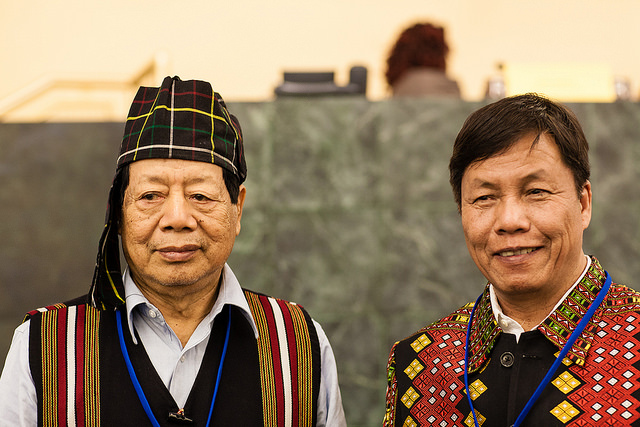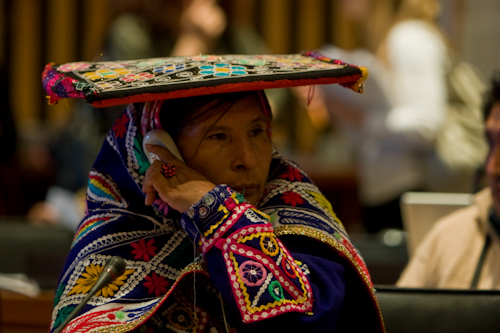Indigenous Peoples and the Millennium Development Goals
“The Forum recommends that agencies and bodies of the United Nations and other inter-governmental organizations rethink the concept of development, with the full participation of indigenous peoples in development processes, taking into account the rights of Indigenous Peoples and the practices of their traditional knowledge.” (E/C.19/2003/22, Para. 26)
The Millennium Development Goals summarized the development goals agreed on at international conferences and world summits during the 1990s. At the end of the last century, world leaders distilled the key goals and targets in the Millennium Declaration (September 2000). The Declaration reaffirmed universal values of human rights, equality, mutual respect and shared responsibility for the conditions of all peoples and sought to redress globalization’s hugely unequal benefits and governments’ committed themselves to fulfilling their obligations by 2015.
 The Millennium Declaration, signed by 147 Heads of State and Government, provided an opportunity for a renewed focus on Indigenous Peoples in the international development debate. As the United Nations Permanent Forum on Indigenous Issues stated during is fourth session, “Indigenous peoples have the right to benefit from the Millennium Development Goals and from other goals and aspirations contained in the Millennium Declaration to the same extent as all others. Indigenous and tribal peoples are lagging behind other parts of the population in the achievement of the goals in most, if not all, the countries in which they live, and indigenous and tribal women commonly face additional gender-based disadvantages and discrimination.” (1)
The Millennium Declaration, signed by 147 Heads of State and Government, provided an opportunity for a renewed focus on Indigenous Peoples in the international development debate. As the United Nations Permanent Forum on Indigenous Issues stated during is fourth session, “Indigenous peoples have the right to benefit from the Millennium Development Goals and from other goals and aspirations contained in the Millennium Declaration to the same extent as all others. Indigenous and tribal peoples are lagging behind other parts of the population in the achievement of the goals in most, if not all, the countries in which they live, and indigenous and tribal women commonly face additional gender-based disadvantages and discrimination.” (1)
The United Nations Permanent Forum on Indigenous Issues (UNPFII) has devoted a great deal of attention to the Millennium Development Goals. Its fourth session (2005) addressed MDG 1 (eradicate extreme poverty and hunger) and MDG 2 (achieve universal primary education) within the context of Indigenous Peoples’ issues and its fifth session (2006) was devoted to the special theme “The Millennium Development Goals and Indigenous Peoples: Redefining the Goals.”
The adoption of the United Nations Declaration on the Rights of Indigenous Peoples by the General Assembly in September 2007, in particular, Articles 41 and 42,(2) provides a crucial opportunity and call to action for states and the UN system to integrate Indigenous visions of development into their work towards the achievement of the MDGs.
Brief overview of the situation facing Indigenous Peoples
Indigenous Peoples have historically faced social exclusion and marginalization. They are disproportionately represented among the poor and extremely poor, their levels of access to adequate health and education services are well below national averages, and they are especially vulnerable to the consequences of environmental degradation.
 Although there is little data on Indigenous Peoples and the Millennium Development Goals, a few figures illustrate the situation faced by Indigenous Peoples around the world. Indigenous Peoples number about 300 to 370 million. While they constitute approximately 5% of the world’s population, Indigenous Peoples make up 15% of the world’s poor.(3) Furthermore, Indigenous Peoples make up about one third of the world’s 900 million extremely poor rural people.(4) Indigenous Peoples face huge disparities in terms of access to and quality of education and health. In Guatemala, for example, 53.5% of Indigenous young people aged 15-19 have not completed primary education, as compared to 32.2% of non-indigenous youth.(5) In Bolivia, the infant mortality rate among the Indigenous population is close to 75/1000, as compared to 50/1000 for the non-indigenous population.(6)
Although there is little data on Indigenous Peoples and the Millennium Development Goals, a few figures illustrate the situation faced by Indigenous Peoples around the world. Indigenous Peoples number about 300 to 370 million. While they constitute approximately 5% of the world’s population, Indigenous Peoples make up 15% of the world’s poor.(3) Furthermore, Indigenous Peoples make up about one third of the world’s 900 million extremely poor rural people.(4) Indigenous Peoples face huge disparities in terms of access to and quality of education and health. In Guatemala, for example, 53.5% of Indigenous young people aged 15-19 have not completed primary education, as compared to 32.2% of non-indigenous youth.(5) In Bolivia, the infant mortality rate among the Indigenous population is close to 75/1000, as compared to 50/1000 for the non-indigenous population.(6)
During the fifth session of the United Nations Permanent Forum on Indigenous Issues, many Indigenous Peoples, through their organizations, made statements about the urgent need to redefine the Millennium Development Goals or the least to recognize the need to redefine approaches to the implementation of the Goals so as to include the perspectives, concerns, experiences and world views of Indigenous Peoples. Statements also confirmed that there was a need for Indigenous Peoples to provide their own definitions of poverty and development and that there should be full and effective participation of Indigenous Peoples in the implementation of the Goals. (7) These insights have been valuable in the evaluation of the MDG framework and the consultations on the new 2030 Agenda.
A human rights-based and culturally sensitive approach to the MDGs
Indigenous Peoples also advocated for underpinning the Millennium Development Goals by a human rights-based approach to development that emphasizes universality, equality, participation and accountability. Working with Indigenous Peoples on sustainable development also demands a culturally sensitive approach, based on respect for and inclusion of Indigenous Peoples’ world-views, perspectives, experiences, and concepts of development. The importance of a rights-based approach and cultural sensitivity has been repeatedly emphasized by the UNPFII, particularly in the reports of its fourth and fifth sessions, which include a series of recommendations on this issue to states, the UN System and Indigenous Peoples’ organizations.
The UNPFII has called for the full and effective participation of Indigenous Peoples in designing, implementing and monitoring MDG-related programmes and projects that concern them or may affect them. In this spirit, the Secretariat of the UNPFII carries out annual desk reviews of national MDG reports to determine to what degree Indigenous issues are considered in these reports and whether Indigenous Peoples participate in MDG monitoring at national level.(8) The reviews carried out in 2006 and 2007 covered approximately 25 countries in Africa, Latin America and Asia and the Pacific and found that, with very few exceptions, Indigenous Peoples’ input has not been included in national MDG monitoring and reporting. The desk reviews also highlight clear gaps in data on Indigenous Peoples and the MDGs. Although most of the reports discuss the disparities affecting Indigenous Peoples, very few of the reports actually provide disaggregated data. Another gap identified in the desk reviews is the lack of mechanisms through which to ensure the input and participation of Indigenous Peoples themselves in the design, implementation and monitoring of policies designed to achieve the MDGs.
Key recommendations on the MDGs
The key recommendations to better integrate Indigenous peoples’ issues into MDG programmes and policies:(9)
- The human rights-based approach to development should be operationalized by States, the UN system and other intergovernmental organizations. The recognition of Indigenous Peoples as distinct peoples and the respect for their individual and collective human rights is crucial for achieving a just and sustainable solution to the widespread poverty that affects them.
- Policies must be put in place to ensure that Indigenous Peoples have universal access to quality, culturally-sensitive social services. Some areas of particular concern are inter-cultural/bilingual education and culturally sensitive maternal and child healthcare.
- MDG-related programmes and policies should be culturally sensitive and include the active participation and free, prior and informed consent of Indigenous Peoples so as to avoid loss of land and natural resources forIndigenous Peoples and the accelerated assimilation and erosion of their cultures. For example, United Nations Country Teams in Bolivia and Kenya have established Indigenous Peoples’ advisory committees to guide programming on Indigenous Peoples ’ issues.
- States and the UN System must make greater efforts to include Indigenous Peoples in MDG monitoring and reporting, including the production of national MDG reports, as well as in the implementation, monitoring and evaluation of MDG-related programmes and policies that will directly or indirectly affect them.
- Improved disaggregation of data is indispensable to properly monitor progress towards MDG achievement in countries with Indigenous populations, and should be a key priority for Governments and the UN System. Several initiatives are currently underway to improve data disaggregation at both national and regional level. ECLAC, for example, has played a key role in improving data on Indigenous Peoples in Latin America and UNPFII has organized a series of regional meetings on indicators of well-being for Indigenous Peoples.
Publications and reports on Indigenous Peoples and the 2030 Agenda
Notes:
(1) UNPFII (2005), Report on the fourth session, E/C.19/2005/9.
(2) Article 41 reads: The organs and specialized agencies of the United Nations system and other intergovernmental organizations shall contribute to the full realization of the provisions of this Declaration through the mobilization, inter alia, of financial cooperation and technical assistance. Ways and means of ensuring participation of indigenous peoples on issues affecting them shall be established.
Article 42 reads: The United Nations, its bodies, including the Permanent Forum on Indigenous Issues, and specialized agencies, including at the country level, and States shall promote respect for and full application of the provisions of this Declaration and follow up the effectiveness of this Declaration.
(3) IFAD (2007), Statistics and key facts about indigenous peoples.
(4) IFAD (2007), Statistics and key facts about indigenous peoples
(5) UNESCO (2004), La conclusión universal de la educación primaria en América Latina: ¿estamos realmente tan cerca? Informe Regional sobre los objetivos de desarrollo del Milenio vinculados a la educación.
(6) ECLAC (2005), Millennium Development Goals: A Latin American and Caribbean Perspective.
(7) UNPFII (2006), Report on the fifth session, E/C.19/2006/11
(8) These desk reviews are available at the top of this page.
(9) These recommendations are drawn from the UNPFII’s fourth and fifth sessions, as well as from the Desk Reviews of national MDG Reports carried out annually by the Secretariat of the UNPFII.
 Welcome to the United Nations
Welcome to the United Nations